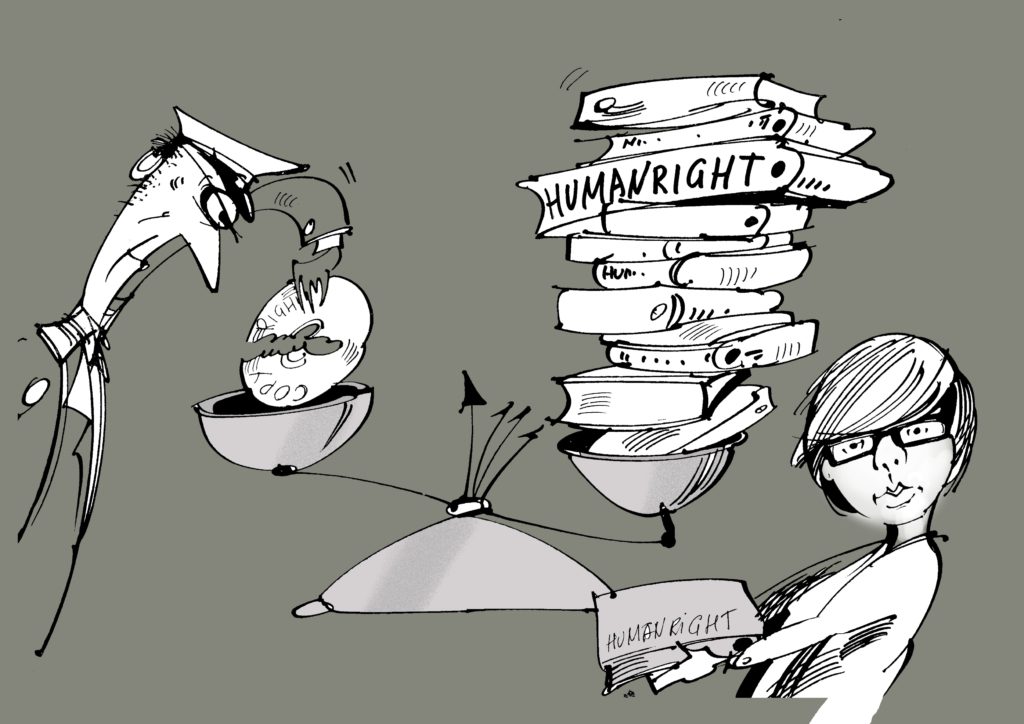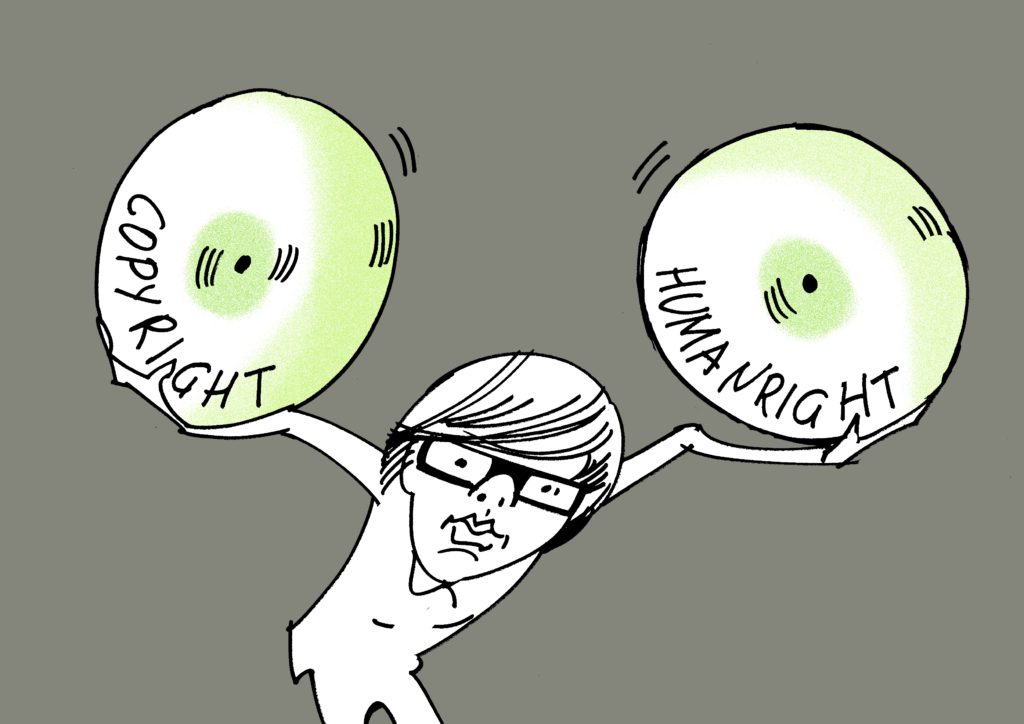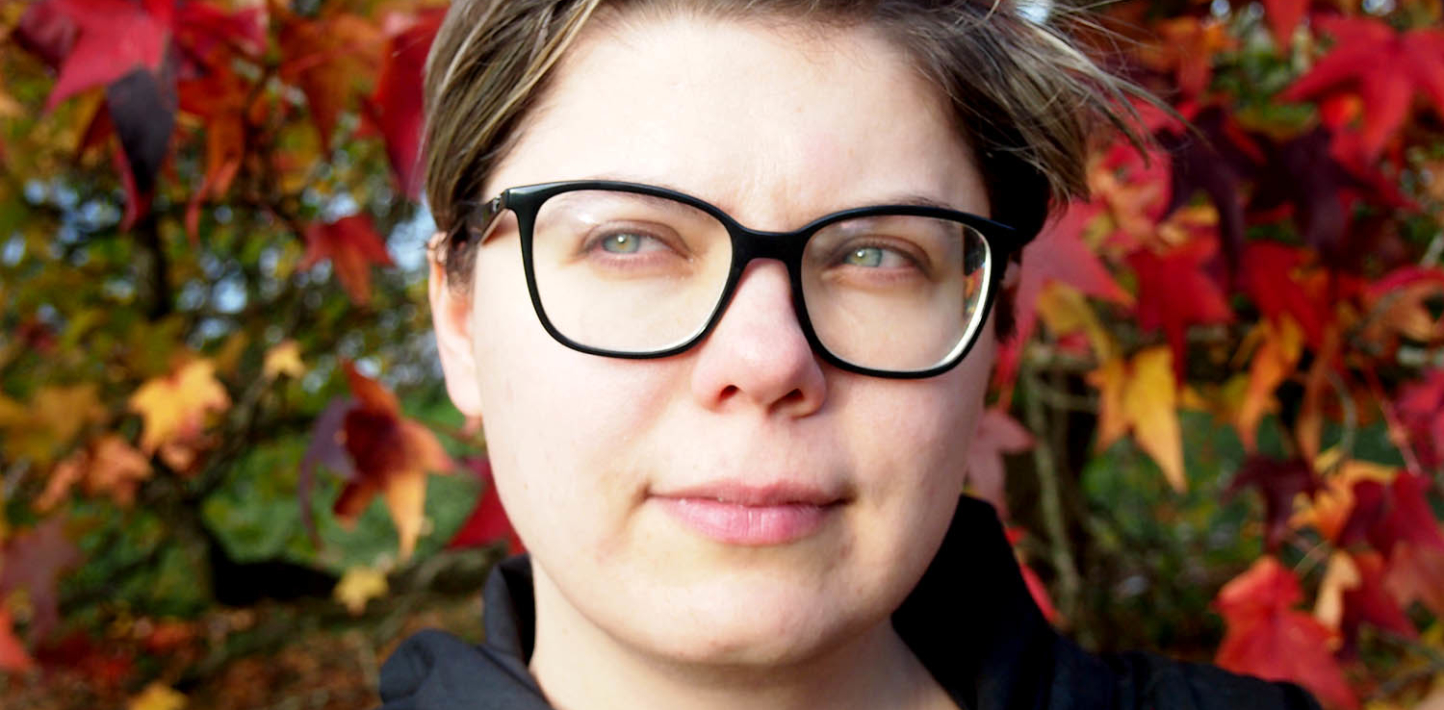Russian authorities tried to stop Denisova from protecting minorities, but her experience strengthened her will to defend human rights and teach others how to do it. Now, she is using human rights education to empower activists through her story.
Stasya Denisova’s childhood growing up in the multi-ethnic region of Krasnodar, by the Black Sea in Russia, was marked by divide and multi-ethnic tensions and conflict. From early in her life, she was exposed to the issues of minority rights and became interested in combatting the rampant hatred she saw and battling the discrimination she witnessed towards certain ethnic groups.
“I have always been very sensitive to the topic of the Holocaust and the nationalistic purges during Soviet times”, Denisova says, “During the rule of Stalin, when she was 18, my Lithuanian grandmother was forcefully sent to Siberia along with countless others. Until her very death, she refused to tell me any details of those times, so unbearable it was for her.” This tragic family story made her act: “In the early 2000s, every attack on a foreign student, every article full of hate speech against ethnic minorities published in local newspapers, every swastika on a random fence, was like a sign telling me that something must be done to prevent new ethnic cleansings, deportations and war”.
In the early 00s, Meskhetian Turks started consistently appearing on the Krasnodar local media. The Meskhetian Turks were originally from Georgia, but they had been forcefully deported to Central Asia by Stalin. In the 1980s, they had to flee after a bloodshed programme in Fergana Valley. Now, they were refugees moving back to Krasnodar, a Russian region close to their native Georgia, but they were failing to find a home there either. Apart from their very different customs, which separated them from the locals, they were denied of local “propiska”, a registration that allows people to get healthcare, to be able to work, drive, marry or buy property. This was an issue faced by other ethnic groups as well – like Ezidi and Khemshil -, but the Meskhetian Turks, being a much larger group, created a bigger problem, which was negatively addressed by both media and authorities.
Witnessing this injustice, Denisova and her university friends decided to take action. Together, they founded their own NGO, a youth group for tolerance they named ‘ETHnICS’. One of ETHnICS first projects was a summer camp on tolerance for young Russian, Ezidi, Khemshil and Meskhetian Turks children to create a cultural understanding between them, opening a line of dialogue that would fight discrimination, and value tolerance.

A great relief finally came when the UNHCR stepped in and thousands of Meskhetian Turks were granted asylum and relocated to the US. Unfortunately, other ethnic groups were not granted the same conditions, even though they suffered from similar injustices. The ETHnICS team continued working across their community, supporting minorities while working on various initiatives, from washing hate symbols drawn on the streets to monitoring human rights violations against ethnic minorities hand in hand with the prominent “Memorial” Human Rights Centre.
During this period, ETHnICS started receiving threats. Denisova explains how it started:
“First, I received anonymous calls, then noticed cars with no number plates following me everywhere. Our volunteers were approached by authorities to make them report on internal decisions, newspapers published articles with lots of abuse and intimidation”.
In one occasion, Denisova wasn’t allowed to fly to Vienna to speak about ethnic minorities discrimination. In another occasion, when coming back into the country, she was detained at the border and, alongside a journalist, questioned on her human rights work for 8 hours.
And then, one day at 6 in the morning, they came. Her flat was searched. All her electronics were taken. When she asked why, she was told by the police that a lawyer from Microsoft had accused her of infringing on Microsoft copyright on ETHnICS’ laptops. From then on, Denisova had to fight for her own rights.
After searching the computers, authorities alleged they had found copyright infringements, a crime punishable with prison up to 6 years. Denisova was restricted to stay in the area and was interrogated repeatedly. She knew the charges were a charade and the authorities’ real goal was to silence government dissidents and Human Rights Defenders. But Denisova’s reality quickly spiralled out of control as the accusations began to affect her personal and professional life.
Because of the accusations, she was fired from her job as an English university lecturer, losing an important source of income. Furthermore, she wasn’t allowed to defend her PhD thesis. She started feeling like she was really a criminal; like maybe she really had done something wrong.

Denisova recalls those difficult times: “That was a truly hard time for me and my family. I was feeling awful. Despite being 100% sure I violated no law, I was urged to feel that maybe I am really kind of a criminal if an investigation says so. That was a horrible feeling, I used to wear a hat closely moved to my eyes not to face my numerous students and their parents. After the police broke into my flat, my mom got a micro stroke, and felt I was fully responsible for that”.
After eight months of continuous interrogations and harassment, the case went to trial. Denisova was worried, “acquittal rate in Russia is below 0.5%, and most court cases lead to a conviction, especially if coming from the authorities”, she explains.
Meanwhile, a global campaign was growing around her case. Thousands wanted to help, all around the world. In Moscow, friends that taught at university’s started talking to their students about the case. Two law students became interested and decided to research Denisova’s story. They became two of her most important supporters, both professionally, by helping her lawyer, and personally, by being there for her when no one else was.
Denisova explains that “In small regions in Russia, outside of Moscow, your case is an example to others. Activists and journalists are afraid to support you or be like you because they could face the same consequences.”. However, much-needed support still existed: “I received numerous calls and cards showing solidarity and support. When Masha and Egor [the two students from Moscow] came to Krasnodar and stayed with me through several interrogations and a trial, this was huge support for me” she points out.
But her case wasn’t isolated. One day, Clifford J. Levy, a journalist for The New York Times, got in touch and revealed that there was a pattern of Microsoft cases going on across Russia. Many of these cases had been built against NGOs and those dissident with the government.
While Levy investigated, Denisova’s case went to court. Thanks to a loud campaign in her support and trial observation’s, the judge acknowledged the many irregularities and mistakes in the work of the authorities and required a new investigation. On their side, Microsoft was struggling with the public condemnation in the US and the tricky situation they were in regarding Denisova’s case. However, even if Microsoft withdrew the complaint, the government would continue prosecution, as copyright violation was considered a serious crime. After long talks, a solution was found: Microsoft would give free licenses to NGOs and small media companies in Russia and 16 other countries with repressive governments. A hotline was opened in London so people could report violations of this agreement. The prosecution’s case started falling apart.

In May 2010, all charges were suddenly dropped and Denisova was a free woman. The prosecutor wrote her an apology letter on behalf of the Russian Federation. But the damage had been done. Her NGO had closed and she had lost her job. Despite this, Denisova stayed optimistic and went back to defending human rights.
But, it wasn’t long before she heard from the authorities again. Barely a few months after, in autumn 2010, she was accused of hate speech against the authorities. Her report on discrimination against minorities mentioned the role of authorities, and that seemed enough accusation to name it “extremist” and attempt to land her in jail.
Within a few nights, Denisova packed her bags and fled the region. She ended up in Moscow, where she was helped by other activists. While she considered seeking asylum abroad, the charges in her region were suddenly dropped. They just wanted her, and her eye-opening work, gone.
Denisova explains how her ordeal only made her want to work harder to defend human rights. She began working with refugees while teaching in Moscow’s Open School of Human Rights. She wanted everyone to know about their rights so they could be equipped to defend their own and others’, to stand in solidarity and take action. “If I hadn’t had the experience of monitoring ethnic minorities, then lived through my own campaign, and for the last 7 years defended refugees’ rights in migration services and courts, I wouldn’t be able to teach human rights” says Denisova, “Practice and theory should go together, and through Human Rights Education we can help shape a new generation of fearless activists”.
Her struggle changed things. “My sufferings weren’t in vain” she explains, “the Microsoft scheme changed, many calls were made to the London hotline and that helped change the fate of countless NGOs”. Her victory also taught people to stand up for others, encouraging them to take action for human rights.
Today, Denisova is an active human rights educator working with Amnesty. She continues fighting for human rights in Russia. “The court is an important place to watch where human rights violations happen; that is a place where injustices may be brought to the daylight” is something her experience taught her. Now, she monitors trials herself and trains others on the importance of trial monitoring in court, supporting the unfairly accused and making sure authorities know there’s always someone looking, making sure injustice doesn’t have a place in the fate of those fighting for human rights.
Inspired by activists from across the globe learning their rights and spreading a global culture of human rights, the Transformative Power of Human Rights Education series is a window into the stories of the human rights defenders that have taken part in Amnesty’s human rights education initiatives. The series sheds light on the transformative power of HRE and the actions these activists go on to take.
Stasya Denisova is a Human Rights Defender from Russia.


